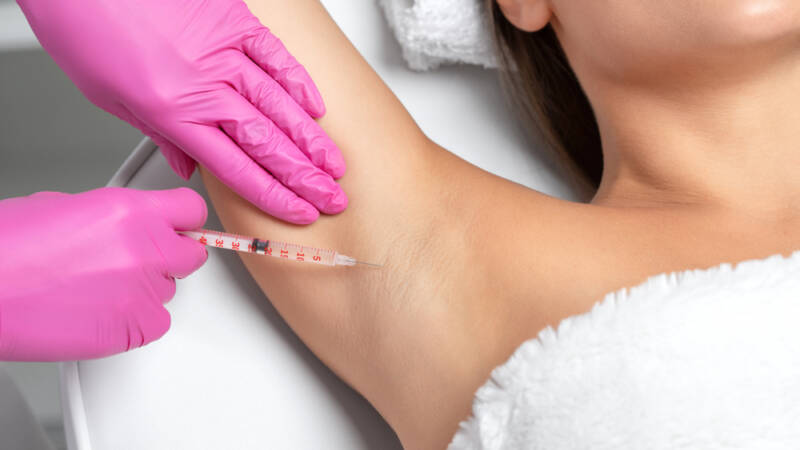Living with Hyperhidrosis: Causes, Symptoms and Treatments

Hyperhidrosis is a condition that causes an abnormal and excessive amount of sweat to be released from the body, which is unrelated to exercise or heat. Dermatologists estimate that 3% of Americans suffer from the condition of excessive sweating in the underarms (axillary hyperhidrosis) or palms and soles of the feet (palmoplantar hyperhidrosis). It causes sweating so significant that it soaks through clothes or drips off a person’s palms. Not only can it disturb daily life, but it causes social anxiety and embarrassment. In fact, 85% wait three or more years to discuss it with an healthcare practitioner and 50% wait 10+ years, in large part because of shame and embarrassment.
Hyperhidrosis can get in the way of a person’s ability to pursue friendships, romantic relationships, and career or business opportunities. In severe cases, people may experience serious practical consequences like being unable to hold a pen, grip a car steering wheel, or shake hands.
Risk Factors
Underarm sweating problems arise in the late adolescent phase, whereas palms and soles sweating usually begin around 13 years. If untreated, hyperhidrosis may persist throughout a person’s life.
The condition usually runs in families and may have a hereditary component. Additionally, many other medical conditions cause heavy sweating, such as hormonal imbalances, diabetes, several skin infections, cardiac illnesses, nervous system issues, low blood sugar, thyroid problems.
Signs and Symptoms
Most people sweat when they perform physical exercise, exert themselves, are in a hot environment, anxious or under stress. The excessive sweating that occurs with hyperhidrosis far exceeds normal sweating though. This condition affects the face, underarms, hands, or feet causes at least one episode a week during waking hours. Interestingly, a person with hyperhidrosis does not sweat while sleeping.
Treatment Options
There are many treatment modalities available to manage this annoying disorder that often produce good results and improves a person’s quality of life. However, if it’s secondary generalized hyperhidrosis (sweating caused by another condition) it is necessary to treat the underlying cause first.
Here are the treatment options that are generally used.
Specialized Antiperspirants
Antiperspirants, especially those containing aluminum salts such as aluminum chloride, have proven effective. Examples include Drysol and Xerac AC. These products usually cause eye irritation, therefore, they should only be applied to the affected area before bed, being careful to carefully wash it off when you get up in the morning. If it causes skin irritation, apply hydrocortisone cream and speak with your doctor or dermatologist.
Medications
Your doctor may prescribe nerve blocking agents like anticholinergics that block certain chemicals that cause sweating in people. Possible side effects include dry mouth, blurred vision, and bladder problems. You should never take these without a prescription.
Botox
Botox treatment with Botulinum toxin injections involves temporarily blocking the nerves that cause sweating. The procedure is uncomfortable as multiple injections are applied to the affected area. The effects last for 6 to 12 months, and then treatment must be repeated. People usually face temporary muscle weakness at the treatment site.
Surgery
Sweat gland removal is a surgical procedure in which the surgeon removes the sweat glands of the armpits. An endoscopic thoracic sympathectomy is another option, which involves severing the nerves that carry signals to your sweat glands. Though these are minimally invasive procedures, they are considered a last resort.
Talk To A Doctor
Hyperhidrosis can cause serious discomfort and embarrassment. In fact, you may have trouble working, enjoying recreational activities, and socializing with people. Therefore seek immediate medical advice if heavy sweating is accompanied by lightheadedness, chest pain, or nausea.
You might also need medical advice if sweating disrupts your daily routine, causes emotional distress or social withdrawal, or if you experience excessive night sweats for no apparent reason,